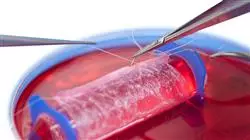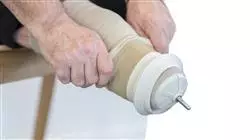University certificate
The world's largest faculty of medicine”
Introduction to the Program
Delve, from the latest scientific postulates, into the most recent developments in Biomedical Implants and In Vivo Devices”

The most recent novelties on biomedical implants and the different in vivo devices have made it possible to address numerous pathologies in a very effective way. This type of implant has provided an answer to major clinical challenges, allowing the professional to accurately monitor patients. Thus, this Postgraduate diploma in Biomedical Implants and In Vivo Devices offers a great opportunity to the physician who wishes to be updated in this important and complex field.
Throughout the degree, the professional will be able to get up to date with the mechanics of biofluids, types of biomaterials and their respective applications, medical devices and nanotechnology, biomaterials for tissue engineering and bioactive molecules, nanoparticles, stem cells and biosensors, among many other relevant issues.
The doctor will also be able to keep up to date thanks to a high-level teaching staff made up of specialists in this field who are familiar with the most advanced techniques in Biomedical Engineering. They will also have numerous multimedia resources, such as videos, theoretical and practical exercises and master classes. All this, through an online learning methodology specially designed for working professionals, since it allows them to combine their work with their studies.
TECH's 100% online methodology will allow you to combine your professional work with this program, which offers you a complete update in the application of biomedical implants"
This Postgraduate diploma in Biomedical Implants and In Vivo Devices contains the most complete and up-to-date scientific program on the market. The most important features include:
- The development of case studies presented by experts in Biomedical Engineering
- The graphic, schematic, and eminently practical contents with which they are created, provide scientific and practical information on the disciplines that are essential for professional practice
- Practical exercises where self-assessment can be used to improve learning
- Its special emphasis on innovative methodologies
- Theoretical lessons, questions to the expert, debate forums on controversial topics, and individual reflection assignments
- Content that is accessible from any fixed or portable device with an Internet connection
This program will bring you up to date on issues such as natural polymeric biomaterials or Tissue Engineering”
The program’s teaching staff includes professionals from the sector who contribute their work experience to this training program, as well as renowned specialists from leading societies and prestigious universities.
The multimedia content, developed with the latest educational technology, will provide the professional with situated and contextual learning, i.e., a simulated environment that will provide immersive training programmed to train in real situations.
This program is designed around Problem Based Learning, whereby the professional must try to solve the different professional practice situations that arise during the academic year. For this purpose, the student will be assisted by an innovative interactive video system created by renowned and experienced experts.
You will have the best teachers and the best didactic resources to facilitate your learning"

The latest advances in nanotechnology and gene therapy applied to biomedical implants are here
Why study at TECH?
TECH is the world’s largest online university. With an impressive catalog of more than 14,000 university programs available in 11 languages, it is positioned as a leader in employability, with a 99% job placement rate. In addition, it relies on an enormous faculty of more than 6,000 professors of the highest international renown.

Study at the world's largest online university and guarantee your professional success. The future starts at TECH”
The world’s best online university according to FORBES
The prestigious Forbes magazine, specialized in business and finance, has highlighted TECH as “the world's best online university” This is what they have recently stated in an article in their digital edition in which they echo the success story of this institution, “thanks to the academic offer it provides, the selection of its teaching staff, and an innovative learning method aimed at educating the professionals of the future”
A revolutionary study method, a cutting-edge faculty and a practical focus: the key to TECH's success.
The most complete study plans on the university scene
TECH offers the most complete study plans on the university scene, with syllabuses that cover fundamental concepts and, at the same time, the main scientific advances in their specific scientific areas. In addition, these programs are continuously being updated to guarantee students the academic vanguard and the most in-demand professional skills. In this way, the university's qualifications provide its graduates with a significant advantage to propel their careers to success.
TECH offers the most comprehensive and intensive study plans on the current university scene.
A world-class teaching staff
TECH's teaching staff is made up of more than 6,000 professors with the highest international recognition. Professors, researchers and top executives of multinational companies, including Isaiah Covington, performance coach of the Boston Celtics; Magda Romanska, principal investigator at Harvard MetaLAB; Ignacio Wistumba, chairman of the department of translational molecular pathology at MD Anderson Cancer Center; and D.W. Pine, creative director of TIME magazine, among others.
Internationally renowned experts, specialized in different branches of Health, Technology, Communication and Business, form part of the TECH faculty.
A unique learning method
TECH is the first university to use Relearning in all its programs. It is the best online learning methodology, accredited with international teaching quality certifications, provided by prestigious educational agencies. In addition, this disruptive educational model is complemented with the “Case Method”, thereby setting up a unique online teaching strategy. Innovative teaching resources are also implemented, including detailed videos, infographics and interactive summaries.
TECH combines Relearning and the Case Method in all its university programs to guarantee excellent theoretical and practical learning, studying whenever and wherever you want.
The world's largest online university
TECH is the world’s largest online university. We are the largest educational institution, with the best and widest online educational catalog, one hundred percent online and covering the vast majority of areas of knowledge. We offer a large selection of our own degrees and accredited online undergraduate and postgraduate degrees. In total, more than 14,000 university degrees, in eleven different languages, make us the largest educational largest in the world.
TECH has the world's most extensive catalog of academic and official programs, available in more than 11 languages.
Google Premier Partner
The American technology giant has awarded TECH the Google Google Premier Partner badge. This award, which is only available to 3% of the world's companies, highlights the efficient, flexible and tailored experience that this university provides to students. The recognition as a Google Premier Partner not only accredits the maximum rigor, performance and investment in TECH's digital infrastructures, but also places this university as one of the world's leading technology companies.
Google has positioned TECH in the top 3% of the world's most important technology companies by awarding it its Google Premier Partner badge.
The official online university of the NBA
TECH is the official online university of the NBA. Thanks to our agreement with the biggest league in basketball, we offer our students exclusive university programs, as well as a wide variety of educational resources focused on the business of the league and other areas of the sports industry. Each program is made up of a uniquely designed syllabus and features exceptional guest hosts: professionals with a distinguished sports background who will offer their expertise on the most relevant topics.
TECH has been selected by the NBA, the world's top basketball league, as its official online university.
The top-rated university by its students
Students have positioned TECH as the world's top-rated university on the main review websites, with a highest rating of 4.9 out of 5, obtained from more than 1,000 reviews. These results consolidate TECH as the benchmark university institution at an international level, reflecting the excellence and positive impact of its educational model.” reflecting the excellence and positive impact of its educational model.”
TECH is the world’s top-rated university by its students.
Leaders in employability
TECH has managed to become the leading university in employability. 99% of its students obtain jobs in the academic field they have studied, within one year of completing any of the university's programs. A similar number achieve immediate career enhancement. All this thanks to a study methodology that bases its effectiveness on the acquisition of practical skills, which are absolutely necessary for professional development.
99% of TECH graduates find a job within a year of completing their studies.
Postgraduate Diploma in Biomedical Implants and In Vivo Devices
The latest advances in biomedical implants, as well as the different In Vivo devices, have made it possible to address numerous pathologies with even more satisfactory results. Not surprisingly, these types of implants have responded to very significant clinical challenges, allowing the professional to accurately monitor each patient. In this context, this Postgraduate Diploma in Biomedical Implants and In Vivo Devices offers a great opportunity for physicians who wish to update their knowledge in this important and complex area.
Become a reference in Nanomedicine
The Postgraduate Diploma in Biomedical Implants and In Vivo Devices delves into the mechanics of biofluids, types of biomaterials and their applications. Students will also learn about medical devices and nanotechnology, tissue engineering, bioactive molecules, nanoparticles, stem cells and biosensors, among other relevant topics. Likewise, the program's teaching staff is made up of specialists in Biomedical Engineering and the student will have access to various multimedia resources, such as videos, theoretical and practical exercises and master classes. All of this is based on a convenient online format that is perfectly compatible with any personal or professional obligation.







